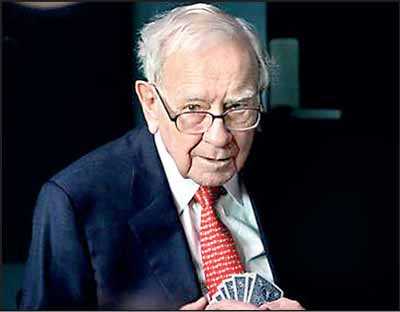Monday Feb 16, 2026
Monday Feb 16, 2026
Friday, 4 January 2019 00:00 - - {{hitsCtrl.values.hits}}
Reuters: Billionaire Warren Buffett has said he would love to see Apple Inc. shares decline in price so he could buy more. He is getting his wish.
 |
Warren Buffett, CEO of Berkshire Hathaway Inc |
Apple’s warning on Wednesday about weak iPhone demand in the holiday quarter due to slower sales in China sent its stock down 7.5% during after-hours trading. Class B shares of Buffett’s Berkshire Hathaway Inc. traded down 2% in the same session on Wall Street.
Buffett, the folksy Nebraska investor known more for buying railroads, energy firms and classic American corporate brands than for his acumen picking tech stocks, in recent years has lamented missing the boat on buying shares in US technology giants. He admitted an earlier investment in IBM Corp was not one of his best.
Yet Buffett has made Apple a centrepiece of his portfolio of other company’s stocks, touting his own use of the Cupertino, California-based company’s products and saying at his annual shareholders’ meeting in Omaha last May, “We would love to see Apple go down in price,” so he could buy more at a bargain.
Buffett sees Apple more as a consumer stock than a tech stock, reflecting the iPhone’s status as a must-have possession for so many people.
Including its after-hours drop on Wednesday, Apple’s stock market value has tumbled to below $700 billion from over $1.1 trillion at its peak in October. Although Apple has fallen behind Amazon.com Inc. and Microsoft Corp in value, it remains one of Wall Street’s most widely held companies.
Shares of Berkshire itself have held up well even as the broader market sank last quarter. Last year, Berkshire returned 2.8%, while the S&P 500 fell 4.4%, including reinvested dividends.
But the $3 billion hit to Berkshire’s Apple shares in evening trading on Wednesday could show in future reported earnings. Those figures do not reflect any long-term gains on Berkshire’s investments, and Buffett has encouraged investors to ignore the profit statistic mandated by US accounting practices.